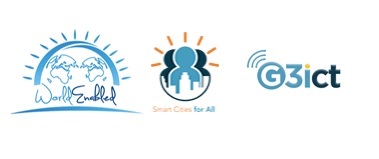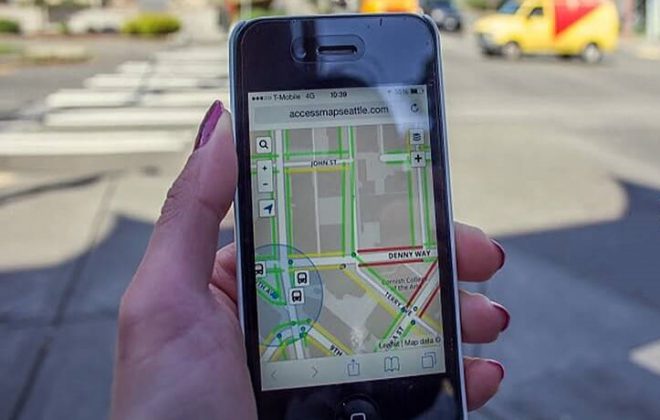Groundbreaking Meeting at the UN tackles AI and Transformative Inclusion for All
Contact: Yulia Sarviro at info@smartcities4all.org
Groundbreaking Meeting at the UN tackles AI and Transformative Inclusion for All
United Nations, New York, June 12, 2018 – Despite significant advances in assistive devices, persons with disabilities and older persons continue to face economic, physical, and political discrimination and exclusion. According to the co-founders of the Smart Cities for All global initiative – Dr. Victor Pineda and James Thurston – social, physical, and institutional barriers too often prevent people with disabilities and older persons from fully enjoying their rights to employment, education, health, justice, and independence. Artificial Intelligence (AI) is an emerging technology that could help break down barriers preventing persons with disabilities from participating in their communities.
Some of the world’s leading figures in human rights and development gathered in New York for the 11th Conference of the States Parties to the Convention on the Rights of Persons with Disabilities (CRPD). As part of the Conference’s side events, the two leading organization that founded the Smart Cities for All global initiative (World Enabled and G3ict) partnered with the governments of the United Arab Emirates, Canada, Singapore, and Denmark to host a discussion of the role AI can play in implementing the Sustainable Development Goals and the Convention on the Rights of Persons with Disabilities. This high-level event was co-sponsored by Microsoft, UN Habitat, the Institute on Disability and Public Policy (IDPP), CBM, and IBM Research.
The event featured experts on artificial intelligence and machine learning, inclusive design, sustainable development, and human rights. The discussion identified policy recommendations and explored collaborative action frameworks for implementing inclusive AI in education, employment, and international development.
“AI has the potential to provide new solutions to more fundamentally weave accessibility and inclusion into the fabric of our lives and society,” said Megan Lawrence, Accessibility Technical Evangelist at Microsoft. Microsoft recently announced a groundbreaking program to support AI for Accessibility. “Through AI for Accessibility, we want to amplify human capacity and come together as a community to cultivate intelligent experiences for people with disabilities in employment, modern life, and human connection.”
These issue areas relate to supporting the objective Sustainable Development Goal 17 which, in conjunction with CRPD Articles 9 and 32, calls for accessibility and cooperation in revitalizing the Global Partnership on Sustainable Development and financing the 2030 Agenda.
H.E. Lana Nusseibeh, Permanent Representative from the UAE Mission to the UN provided opening remarks, setting the stage for the expert discussion. She said, “AI and other technologies have an increasingly important role to play – by harnessing these technologies effectively, we have a real shot at implementing the sustainable development goals without leaving persons with disabilities behind.”
The world’s first and only Minister of State for Artificial Intelligence H.E. Omar bin Sultan al Olama delivered video remarks, stating “Artificial intelligence should be a medium for inclusion.” He added that “Our government is going to be a lot more efficient because of artificial intelligence, and we need to make sure these efficiency savings go towards investing in making the lives of people in the entire nation better.”
As an urban planner and as the director of the Inclusive Cities Lab at the Institute of Urban and Regional Development Dr. Victor Pineda provided a guiding framework. “AI can help impact more inclusive urban development. AI and machine learning can dramatically alter the way we build our cities and respond to the diverse lifestyles of people who may prefer to roll instead of walk, hear written communication instead of read it, or conversely see spoken communication instead of hear it,” he said.
James Thurston, co-founder of the Smart Cities for All global initiative added, “We are looking to AI and other emerging technologies to have a positive and disruptive effect in many critical areas, including the future of work. City leaders now have an opportunity to explore how AI can improve vocational and educational programs for people with disabilities and how it can facilitate an open and accessible work environment.”
Though artificial intelligence presents an as-yet unknown challenge to current digital development policies and inclusion efforts for persons with disabilities and older persons, proactive movement toward inclusive policies and international cooperation on digital development can mitigate or prevent these challenges.
“The inclusion of people with disabilities in AI technology development is very important,” said Dr. Shari Trewin, ACM Distinguished scientist and AI researcher at IBM. “We want to avoid bias in machine learning and make sure that AI is solving problems people actually want solved. Consumers need to be in the driver’s seat.”
Deepti Raja from the World Bank also spoke during the event, saying that the World Bank projects have been working on implementing artificial intelligence in development. “AI helps us make better predictions, especially in situations where there is a lack of data, and improve service delivery,” Raja said. “It also helps us enhance individual capacity, enabling people to learn and engage in the workspace.”
The gathering also offered a way forward. Speakers committed to strengthening partnerships to build a framework for disability-responsive AI and explore how to advance legislative measures, budgetary and executive support needed to expand access in equitable and inclusive manner. Speakers also noted that there continue to be opportunities for partnerships to strengthen institutional capacity, change attitudes and beliefs, and increase the participation of people with disabilities.
Dr. Pineda stated in the concluding remarks, “Events like today, and resources like the Smart Cities for All Toolkit contribute to the global efforts by city leaders that ensure the future does not just benefit some, but all of us.”
About G3ict
The Global Initiative for Inclusive Information and Communication Technologies is an advocacy initiative launched in December 2006 by the United Nations Global Alliance for ICT and Development, in cooperation with the Secretariat for the Convention on the Rights of Persons with Disabilities at UN DESA. Its mission is to support and help implement the goals of the Convention on the Rights of Persons with Disabilities (CRPD), promoting digital accessibility and Assistive Technologies. More information can be found at http://g3ict.org.
About World Enabled
World Enabled is a global education, communications, and strategic consulting group. It supports companies and governments with the full implementation of legal mandates that promote the rights of persons with disabilities. Its work and research initiatives focus on urban planning and inclusive urban development. With its international partners, it helps build inclusive societies where people with disabilities can fully develop their talents and reach their full potential. More information can be found at http://worldenabled.org/.
About Smart Cities for All
In 2016, G3ict and World Enabled launched a research project to assess information and communication technology (ICT) accessibility in smart cities around the world. They surveyed more than 250 experts and smart city program managers, 60% of whom responded that smart cities were failing people with disabilities. Only 18% of respondents knew of a smart city that uses ICT accessibility standards. As a result of the findings, and with support from Microsoft, the two NGOs created the Smart Cities for All Toolkit, featuring four digital tools to help those involved in city planning to make future technology projects more inclusive. James Thurston, Vice President at G3ict, and Dr. Victor Pineda, President at World Enabled, lead the Smart Cities for All initiative launched in 2016. Both James and Victor are accessibility experts who are committed to building a broad global coalition to ensure that persons with disabilities and older persons enjoy the advances of smart cities on an equal basis with other citizens. Learn more about Smart Cities for All: http://www.smartcities4all.org/.
Upcoming Events
There are no upcoming events.




